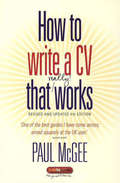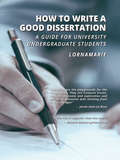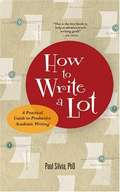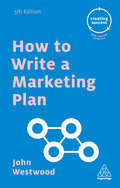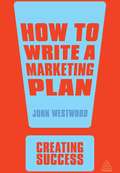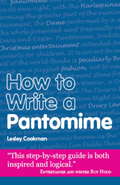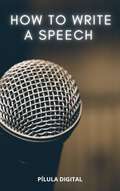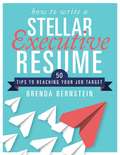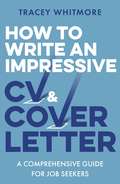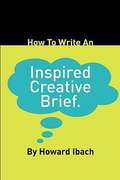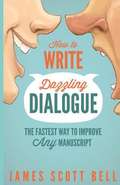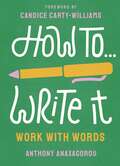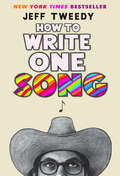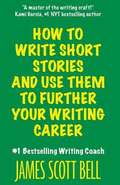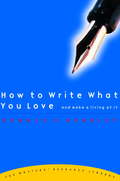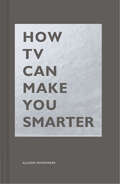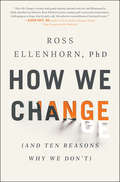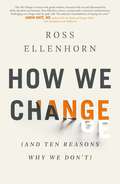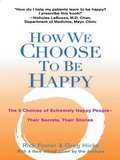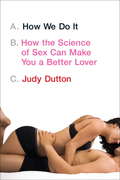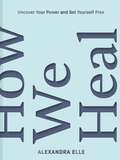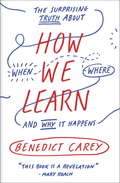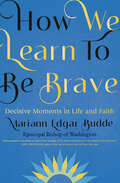- Table View
- List View
How To Write a CV That Really Works: A Concise, Clear And Comprehensive Guide To Writing An Effective Cv
by Paul McGeeA guide for those who want to create an effective CV and use it to market themselves. It contains sample CVs and covering letters and interview guidance.
How To Write a CV That Really Works: A Concise, Clear and Comprehensive Guide to Writing an Effective CV
by Paul McGeeA guide for those who want to create an effective CV and use it to market themselves. It contains sample CVs and covering letters and interview guidance.
How to Write a Good Dissertation A guide for University Undergraduate Students
by LornaMarieHow to Write a Good Dissertation - A Guide for University Undergraduate Students is an essential reference guide for university undergraduate student and anyone who wishes to write at professional level. Every undergraduate student will at some point be required to write a dissertation, project, a portfolio or thesis. This could be daunting and having gone through that experience myself, I thought a book like this would be helpful to students around the world. I have tried to keep it concise, succinct, and as brief as much as possible; the last thing a student need is reading a lengthy guide on how to write their onerous project. Most of the chapters cover topics every student will find useful regardless of their course of study. This book covers essential policies, guidelines and procedures set out in the code of practice for writing projects in most reputable universities around the world. The author covered essential topics that every student must have at their fingertips such as choosing a research topic, using the library and using database for searches, copyright, editing, gathering and collating information, citing references, code of practice in research, evidence-based approach, confidentiality, privacy and data protection, and virtual learning environment. Formatting, editing, binding and finishing your project are all succinctly explained in simple English language in this book.
How to Write a Lot: A Practical Guide to Productive Academic Writing
by Paul J. SilviaAll students and professors need to write, and many struggle to finish their stalled dissertations, journal articles, book chapters, or grant proposals. Writing is hard work and can be difficult to wedge into a frenetic academic schedule. In this practical, light-hearted, and encouraging book, Paul Silvia explains that writing productively does not require innate skills or special traits but specific tactics and actions. Drawing examples from his own field of psychology, he shows readers how to overcome motivational roadblocks and become prolific without sacrificing evenings, weekends, and vacations. After describing strategies for writing productively, the author gives detailed advice from the trenches on how to write, submit, revise, and resubmit articles, how to improve writing quality, and how to write and publish academic work.
How to Write a Marketing Plan
by John WestwoodHow to Write a Marketing Plan provides a step-by-step guide to creating a successful marketing plan: from carrying out a marketing audit, setting objectives and devising budgets to writing, presenting and implementing the plan. With brand new content on producing mini-plans and seizing new opportunities quickly, it also contains the most current information on email marketing, web usage, mobile commerce and social media. Including helpful chapter summaries and a detailed sample marketing plan, How to Write a Marketing Plan is essential reading for anyone who wants to boost their product or business. The creating success series of books...With over one million copies sold, the hugely popular Creating Success series covers a wide variety of topics and is written by an expert team of internationally best-selling authors and business experts. This indispensable business skills collection is packed with new features, practical content and inspiring guidance for readers across all stages of their careers.
How to Write a Marketing Plan
by John WestwoodHow to Write a Marketing Plan, 4th edition, simplifies the task of developing a marketing plan for a product or business. Taking a step-by-step approach to the entire process, from carrying out a marketing audit, setting objectives and devising budgets, to writing and presenting the plan and finally, implementation. With a brand new chapter to help you produce mini-plans and seize new opportunities quickly, it is essential reading for anyone who wants to boost their business, sell products or services and learn the techniques of market research.
How to Write a Pantomime (Secrets to Success)
by Lesley CookmanThere are thousands of pantomimes staged throughout the world every year, most of them in Britain. Most groups, whether they be amateur drama societies, schools, Women's Institutes or Village Hall committees are constantly on the lookout for something fresh and original. This is often a matter of economics, as professional pantomimes can be costly in terms of performing rights, let alone the cost of scripts. This book is aimed at those people who take part in this increasingly popular hobby, and at the writer who wishes to write a pantomime, either for a local group, or, indeed, for mass publication.
How to Write a Speech: Tips for crafting a winning speech
by Pílula DigitalA well-STRUCTURED speech not only makes SENSE from beginning to end but IT is also EASIER to REMEMBER and quote. There is no point in speaking very well if the LOGIC of the words is lost in the oratory. In this E-BOOK you will LEARN how to write a SUCCESSFUL speech from opening to closing, with the POWER to convey your idea in a CLEAR and objective way. Good reading!
How to Write a Stellar Executive Resume: 50 Tips to Reaching Your Job Target
by Brenda BernsteinHow to Write a Stellar Executive Resume is a step-by-step guide that empowers readers to create an effective and stand out from the crowd as a top candidate for an executive position. Brenda Bernstein, a Certified Executive Resume Master and author of the #1 Bestseller How to Write a Killer LinkedIn Profile, shares the tips and tricks she’s learned from more than two decades of helping job seekers get connected with the right position. Readers will discover: • The importance of knowing the target audience and how to best connect with them • Key social media tips for spreading the word about their skills and experiences • Why good ol’ cover letters are important, and how to use them effectively • Power verbs to use, and words to avoid • Samples of successful resumes For many executives conducting a job search, it may have been quite a while since they were last “looking.” It’s easier than ever to apply for a job – and as a result, there’s a lot of competition for a limited number of openings. There’s a lot to learn about the recruiting world we live in, and the best ways to use the tools at our disposal. This book provides practical, proven, up-to-date best practices for creating an effective executive resume that gets results.
How to Write an Impressive CV and Cover Letter: A Comprehensive Guide for Jobseekers
by Tracey WhitmoreYour CV, cover letter and LinkedIn profile are your first communication with a prospective employer. As the job market is more competitive than ever, grabbing an employer's attention and making the right first impression has never been more important. If you compromise on the quality of your CV, cover letter and LinkedIn profile, you reduce your chances of winning an interview.This book, which will appeal to anyone from entry level to board level, is a step-by-step guide on how to approach job hunting and achieve a killer competitive advantage by producing an impressive CV, cover letter and LinkedIn profile. Invaluable views and advice from senior HR and industry professionals, who are often the first point of entry, are provided throughout the book.How to Write an Impressive CV and Cover Letter will support jobseekers through the entire job-hunting process. It offers access to practical, real-life examples of CVs and cover letters that have secured interviews and helped individuals win their dream job. Readers will gain access to these documents, together with valuable templates, as part of the book.
How to Write an Impressive CV and Cover Letter: A Comprehensive Guide for Jobseekers
by Tracey WhitmoreYour CV, cover letter and LinkedIn profile are your first communication with a prospective employer. As the job market is more competitive than ever, grabbing an employer's attention and making the right first impression has never been more important. If you compromise on the quality of your CV, cover letter and LinkedIn profile, you reduce your chances of winning an interview.This book, which will appeal to anyone from entry level to board level, is a step-by-step guide on how to approach job hunting and achieve a killer competitive advantage by producing an impressive CV, cover letter and LinkedIn profile. Invaluable views and advice from senior HR and industry professionals, who are often the first point of entry, are provided throughout the book.How to Write an Impressive CV and Cover Letter will support jobseekers through the entire job-hunting process. It offers access to practical, real-life examples of CVs and cover letters that have secured interviews and helped individuals win their dream job. Readers will gain access to these documents, together with valuable templates, as part of the book.
How to Write an Inspired Creative Brief
by Howard IbachThis book is very much useful for educators and students who are interested in marketing, advertising or public relations and also for those engaged in selling, marketing a product or service.
How to Write Dazzling Dialogue: The Fastest Way to Improve Any Manuscript
by James BellThere is one sure-fire way of improving your novel fast. . . You may know the fundamentals of how to write fiction. You may be more than competent in plot, structure and characters. But if your dialogue is dull it will drag the whole story down. On the other hand, if your dialogue is crisp and full of tension it immediately grabs the reader. And if that reader is an agent or editor, sharp dialogue will give them instant assurance that you know what you're doing as a writer. Writing a bestseller or hot screenplay is no easy task, but dazzling dialogue is an absolute essential if you want to get there. The best part is, the skills of the dialogue craft are easy to understand and put into practice. #1 bestselling writing coach James Scott Bell has put together and expanded upon the dialogue lectures from his popular writing seminars. In How to Write Dazzling Dialogue you'll learn: What fictional dialogue is ... and isn't The 11 secrets of crafting memorable dialogue The 5 essential tasks of dialogue 5 ways to improve your dialogue ear 4 can't-miss methods to increase conflict and tension in any dialogue exchange The top 10 dialogue issues, and how to resolve them You'll also see dazzling dialogue in action with examples from hit novels and screenplays. Don't sabotage your chances of selling your work to readers or publishers because the dialogue is unexceptional. Dazzle them with what the characters say. How to Write Dazzling Dialogue will give you the tools to do it.
How To Write It: Work With Words (Merky How To #1)
by Anthony Anaxagorou_________________________How to Write It: Tell Your StoryThis book is a masterclass in the craft of writing and poetry from one of Britain's most celebrated poets and educators, T.S. Eliot Prize nominee Anthony Anaxagorou.Taking readers on a personal journey through his early life and school years, through to his relationship with literature, education poetry and writing, this book is filled with tips, anecdotes and publishing advice for anyone interested in getting their work seen. From Anthony's first slam win to the evolving British poetry scene, this book will provoke readers into thinking about their writing more carefully - be it a poem, short story or novel - and help them finally get their book out into the world.This book is essential reading for taking your work to the next level, and is introduced with an inspirational foreword by Sunday Times bestselling author, Candice Carty-Williams. _________________________'This brilliant little book [...] a guide to writing practical and theoretical' Radio 4, 'Start The Week'_________________________Designed to inspire and encourage readers to unlock their potential and provoke change, the How To series offers a new model in publishing, helping to break down knowledge barriers and uplift the next generation. Creatively presented and packed with clear, step-by-step, practical advice, this series is essential reading for anyone seeking guidance to thrive in the modern world. Curate your bookshelf with these collectable titles.
How to Write One Song: Loving The Things We Create And How They Love Us Back
by Jeff TweedyThere are few creative acts more mysterious and magical than writing a song. But what if the goal wasn't so mysterious and was actually achievable for anyone who wants to experience more magic and creativity in their life? That's something that anyone will be inspired to do after reading Jeff Tweedy's How to Write One Song. Why one song? Because the difference between one song and many songs isn't a cute semantic trick—it's an important distinction that can simplify a notoriously confusing art form. The idea of becoming a capital-S songwriter can seem daunting, but approached as a focused, self-contained event, the mystery and fear subsides, and songwriting becomes an exciting pursuit. And then there is the energizing, nourishing creativity that can open up. How to Write One Song brings readers into the intimate process of writing one song—lyrics, music, and putting it all together—and accesses the deep sense of wonder that remains at the heart of this curious, yet incredibly fulfilling, artistic act. But it&’s equally about the importance of making creativity part of your life every day, and of experiencing the hope, inspiration, and joy available to anyone who&’s willing to get started.
How to Write Short Stories and Use Them to Further Your Writing Career
by James Scott BellAs most writers will tell you, the hardest fiction form to master is the short story. To be successful, a short story needs to have "emotional wallop," and in under 7,000 words. Not easy to do. In this book, #1 bestselling writing teacher James Scott Bell explains the essential ingredient for a successful short story, no matter the genre. He shows how any writer—whether planner or "pantser"—can use this key to unlock infinite story possibilities. And turn readers into fans. Which is part of the strategy for short story writing today. With the coming of the digital revolution in publishing, short fiction presents possibilities beyond a one-time sale to a literary journal. Writers can use stories to increase discoverability, grow as a writer, generate some side income, and get back in touch with the sheer joy of writing. This book uses examples from the best stories by undisputed masters of the craft, including Ernest Hemingway, Raymond Carver, John Cheever, Stephen King and Irwin Shaw. In addition, five complete stories are included to show you the master key in action. Once you've been through this book, even once, you'll be well on your way to crafting short stories that readers love—which will build your fan base and boost your long-term writing career.
How to Write What You Love and Make a Living at It
by Dennis E. HensleyA writers’ writer shares his secrets The author of 49 books and over 3,000 articles, Dennis Hensley shares his secrets for making it as an author. He discusses how to find a distinctive style, how to make time to write, and how to negotiate contracts. In easy-to-follow steps, the book outlines the keys to contacting agents, securing copyrights, and selling manuscripts to more than one market. Lots of people want to make it as writers. Hensley tells you how to do it — and enjoy the process.
How TV Can Make You Smarter (The HOW Series)
by Allison ShoemakerHow TV Can Make You Smarter is a lively guide that shows readers the numerous emotional and intellectual benefits of TV. Contrary to conventional wisdom, television can do more than help you veg out, chill, and escape. Author and TV critic Allison Shoemaker rewires our thinking to show readers how to take advantage of our 24/7 access to this ever-evolving medium.• TV is a powerful tool and How TV Can Make You Smarter will teach you how to use it.• Covers a wide selection of diverse genres from scripted comedies, dramas, and classics to reality and beyond• Find acceptance in embracing "bad" TV, and learn to love yourself in the morning.Lessons include learning how to gain empathy (Mad Men), broadening your perspective (Rupaul's Drag Race), and discovering how working within boundaries (Doctor Who) or breaking them apart (Buffy the Vampire Slayer) can be good for you.Part of the HOW series, the accessible and authoritative guides to engaging with the arts the world, and ourselves.• Filled with smart, unintimidating content in a giftable foil-stamped package• Great for TV and movie buffs, Netflix and Hulu subscribers, DVD owners, and anyone who loves to unwind with television• Packed with insightful tips and tricks for making the most out of what you watch• You'll love this book if you love books like Amusing Ourselves to Death: Public Discourse in the Age of Show Business by Neil Postman, Everything Bad Is Good for You: How Today's Popular Culture Is Actually Making Us Smarter by Steven Johnson, and I Like to Watch: Arguing My Way Through the TV Revolution by Emily Nussbaum.
How We Change: (And Ten Reasons Why We Don't)
by Nathan AginThe Coronavirus pandemic has revealed a very big secret we’ve been keeping from ourselves and each other: We can be remarkably agile in the face of change. How is it that we are able to so radically and rapidly change our daily behavior in order to follow the social distancing and stay-at-home policies during the pandemic, and yet--pandemic or not--we typically find it difficult, if not impossible, to reach smaller personal goals like dieting, getting organized or changing destructive habits? The pandemic is life-threatening, so it ignites our survival instincts, activating that part of our brains charged with speedily and efficiently getting us to safety. But cholesterol, alcohol, and physical passivity are all life-threatening, and many of us humans have done a lousy job changing in regard to these issues, even when we have reliable information that they are killing us. Why do we struggle to change what would so obviously help ourselves individually? Ross Ellenhorn’s book, How we Change (and the Ten Reasons Why We Don’t) gives a fascinating answer. A clinician and thought leader in the mental health and addiction fields, he suggests that we’re often looking in the wrong direction when we try to decipher the factors that support human change. He suggests that it’s much more fruitful to look at why we don’t change, than figure out why we do. By looking at the reasons we don’t change, we give ourselves the best chance of actually changing in meaningful ways. Ellenhorn explains how we are wired to double down on the familiar because of what he calls the "Fear of Hope" - the act of protecting ourselves from further disappointment—and identifies the “10 Reasons Not to Change” to help us see why we behave the way we do when we are faced with the challenge of hope. Among them are: · To change means raising your expectations and thus risking that you’ll disappoint yourself.· Once you change, you are more accountable to make other changes than if you stayed the same· When you change, your future become much less predictable.· Change means destroying psychological monuments you’ve built to commemorate past injuries· Every time you change, you raise the possibility of losing or disrupting your relationship with certain peopleBy addressing this little known reality of fear of hope, and how it influences the 10 Reasons Not to Change, Ellenhorn actually gives us hope, helping us to work toward the change we seek. Ellenhorn speaks to the core of our insecurities and fears about ourselves, with a humor and kindness. By turning our judgments about self-destructive behaviors into curious questions about them, he teaches us to think about our actions to discover what we truly want - even if we’re going about getting it in the wrong way. How We Change is a brilliant approach that will forever alter our perspective - and help us achieve the transformation we truly seek.
How We Change (and 10 Reasons Why We Don't): (and Ten Reasons Why We Don't)
by Dr Ross EllenhornA paradigm-shifting, instant classic in the making that challenges our assumptions about change by encouraging us to understand and embrace our resistance to it.We all have something we want to change about ourselves. But whether it's quitting smoking, losing weight, or breaking some common bad habit or negative behaviour pattern, we feel a sense of failure when we don't succeed. This often sets off a cascade of negative feelings and discouragement, making it even harder to change. The voice in our head tells us: Why bother?Successful change depends far more on understanding why we don't change, psychotherapist and sociologist Ross Ellenhorn insists. His decades-long career as a pioneer in helping people overcome extreme psychiatric experiences and problematic substance use issues - especially those whom the behavioural healthcare system has failed - especially those whom the mental healthcare system has failed - has lead him to develop an effective, long-term method to achieve transformation, from the simplest shifts to the most profound. In How We Change, Ellenhorn looks to the evolutionary imperatives driving us. We are wired to double down on the familiar because of what he calls the Fear of Hope - the act of protecting ourselves from further disappointment. He identifies the '10 Reasons Not to Change' to help us see why we behave the way we do, making it clear that there is nothing broken inside us - it's how we're built. By addressing this little known reality, he gives us hope and helps us work toward the change we seek. Ellenhorn speaks to the core of our insecurities and fears about ourselves, with a humour and kindness. By turning our judgements about self-destructive behaviours into curious questions about them, he teaches us to think about our actions to discover what we truly want - even if we're going about getting it in the wrong way. How We Change is a brilliant approach that will forever alter our perspective and help us achieve the transformation we truly seek.
How We Choose to Be Happy
by Rick FosterWhat does it mean to be truly happy? Is there a secret to happiness?To most people it is self-evident--the secret to true happiness is not found in riches, things, or events. The source of happiness, as revealed in this insightful, inspiring, and infinitely practical book, is to be found in the way we choose to live our lives. Truly happy people make conscious decisions about how they will confront all of life's challenges. In the face of sometimes overwhelming circumstances, they create happiness by making the same nine internal, principle-centered choices. The people whose stories illuminate this book, representing a wide range of ages, and economic, social, political, and religious backgrounds, all make an active commitment to be happy. They are accountable for their own actions, thoughts, and feelings. They identify what makes them happy and make it central to their lives. Happy people find meaning and emotional energy in every event. They are flexible and open to life's many options. They appreciate what they have, and give unceasingly with no expectation of a "return. " Happy people are truthful with themselves and others. How We Choose to Be Happy explores the nine choices that extremely happy people make, and shows how anyone can follow these tenets to create a unique personal experience.
How We Do It: How the Science of Sex Can Make You a Better Lover
by Judy DuttonIn How We Do It, Judy Dutton explains everything that's going on chemically, neurologically, and biologically during a typical sexual encounter from first spark to climax-and reveals what really turns us on and how we can put that knowledge to use behind our closed bedroom doors. You'll learn the answers to perplexing questions like:
How We Heal: Uncover Your Power and Set Yourself Free
by Alexandra ElleBeloved wellness author and teacher Alexandra Elle shares this practical and empowering guide to self-healing. In How We Heal, bestselling author Alexandra Elle offers a life-changing invitation to heal yourself and reclaim your peace. In these pages, readers will discover essential techniques for self-healing, including journaling rituals to cultivate innate strength, accessible tools for processing difficult emotions, and restorative meditations to ease the mind. Alex Elle elegantly weaves together themes like self-healing, mindfulness, inner child work, and boundary setting and presents the reader with easy-to-follow practices that have changed her life and the lives of the thousands of people she has taught. Her 4-part framework for healing will appeal to anyone who wants a clear process, while the compelling personal stories leave the reader feeling connected and ready to begin again. Complementing the practices are powerful insights from Alex Elle's own journey of self-discovery using writing to heal, plus remarkable stories of healing from a range of luminary voices, including Nedra Tawwab, Morgan Harper Nichols, Dr. Thema Bryant, Barb Schmidt, and many more. Brimming with encouragement and delivered with Alex Elle's signature warmth and candor, How We Heal is a must-have companion for anyone that wants to unlock their inner wisdom and confidence to heal on their own.
How We Learn: The Surprising Truth About When, Where, and Why It Happens
by Benedict CareyIn the tradition of The Power of Habit and Thinking, Fast and Slow comes a practical, playful, and endlessly fascinating guide to what we really know about learning and memory today--and how we can apply it to our own lives. From an early age, it is drilled into our heads: Restlessness, distraction, and ignorance are the enemies of success. We're told that learning is all self-discipline, that we must confine ourselves to designated study areas, turn off the music, and maintain a strict ritual if we want to ace that test, memorize that presentation, or nail that piano recital. But what if almost everything we were told about learning is wrong? And what if there was a way to achieve more with less effort? In How We Learn, award-winning science reporter Benedict Carey sifts through decades of education research and landmark studies to uncover the truth about how our brains absorb and retain information. What he discovers is that, from the moment we are born, we are all learning quickly, efficiently, and automatically; but in our zeal to systematize the process we have ignored valuable, naturally enjoyable learning tools like forgetting, sleeping, and daydreaming. Is a dedicated desk in a quiet room really the best way to study? Can altering your routine improve your recall? Are there times when distraction is good? Is repetition necessary? Carey's search for answers to these questions yields a wealth of strategies that make learning more a part of our everyday lives--and less of a chore. By road testing many of the counterintuitive techniques described in this book, Carey shows how we can flex the neural muscles that make deep learning possible. Along the way he reveals why teachers should give final exams on the first day of class, why it's wise to interleave subjects and concepts when learning any new skill, and when it's smarter to stay up late prepping for that presentation than to rise early for one last cram session. And if this requires some suspension of disbelief, that's because the research defies what we've been told, throughout our lives, about how best to learn. The brain is not like a muscle, at least not in any straightforward sense. It is something else altogether, sensitive to mood, to timing, to circadian rhythms, as well as to location and environment. It doesn't take orders well, to put it mildly. If the brain is a learning machine, then it is an eccentric one. In How We Learn, Benedict Carey shows us how to exploit its quirks to our advantage.
How We Learn to Be Brave: Decisive Moments in Life and Faith
by Mariann Edgar BuddeAn inspirational guide to the key junctures in life that, if navigated with faith and discernment, pave the way for us to become our most courageous selves, by the bishop of the famed Episcopal Diocese of Washington, D.C.The decisive moments in life are those pivot points when we&’re called on to push past our fears and act with strength. With How We Learn to Be Brave, Bishop Mariann Budde teaches us to respond with clarity and grace even in the toughest times. Being brave is not a singular occurrence; it&’s a journey that we can choose to undertake every day. Here, Bishop Budde explores the full range of decisive moments, from the most visible and dramatic (the decision to go), to the internal and personal (the decision to stay), to brave choices made with an eye toward the future (the decision to start), those born of suffering (the decision to accept that which we did not choose), and those that come unexpectedly (the decision to step up to the plate). Drawing on examples ranging from Harry Potter to the Gospel According to Luke, she seamlessly weaves together personal experiences with stories from scripture, history, and pop culture to underscore both the universality of these moments and the particular call each one of us must heed when they arrive. With Bishop Budde&’s wisdom, readers will learn to live and to respond according to their true beliefs and in ways that align with their best selves. How We Learn to Be Brave will provide much-needed fortitude and insight to anyone searching for answers in uncertain times.
